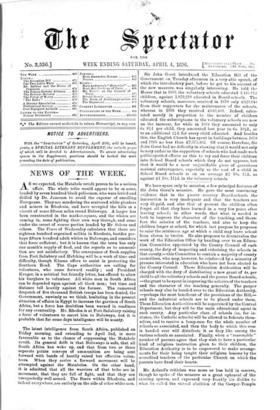We have space only to mention a few principal features
of Sir John Gorses measure. He gave the most convincing evidence that in the poorer country Board-schools the instruction is very inadequate and that the teachers are very ill-paid, and also that at present the children often forget all that they have learned in a very few years after leaving school ; in other words, that what is needed is both to improve the character of the teaching, and there- fore the salaries of the teachers, and also to keep the children longer at school, for which last purpose he proposes to raise the minimum age at which a child may leave school from eleven to twelve. He also proposes to decentralise the work of the Education Office by handing over to an Educa- tion Committee appointed by the County Council of each county, the duty of inspecting and criticising the schools in that county,—this Committee to contain a majority of county councillors, who may, however, be reinforced by a minority of persons interested in education who have not been elected to the County Council. These Education Authorities will be charged with the duty of distributing a new grant of 4s. per child to all the voluntary schools and the poorer Board-schools, — the grant to be spent in improving the salaries of the teachers and the character of the teaching generally. The pauper schools may also be handed over to the Education Authority, — perhaps the most beneficent of the provisions of the Bill,— and the industrial schools are to be placed under them. These Education Authorities will be supervised by the Central Department, but they will be the main educational agent in each county. Any particular class of schools (as, for in- stance, the Catholic schools) will be allowed to federate them- selves, and to receive a lump-sum for the whole number of schools so associated, and then the body to which this sum is handed over will distribute it as they like among the various schools so associated. Finally, when a "reasonable" number of parents agree that they wish to have a particular kind of religions instruction given to their children, the Education Authority is to be empowered to make arrange- ments for their being taught their religions lessons by the accredited teachers of the particular Church on which the parents have fixed their hearts.


































